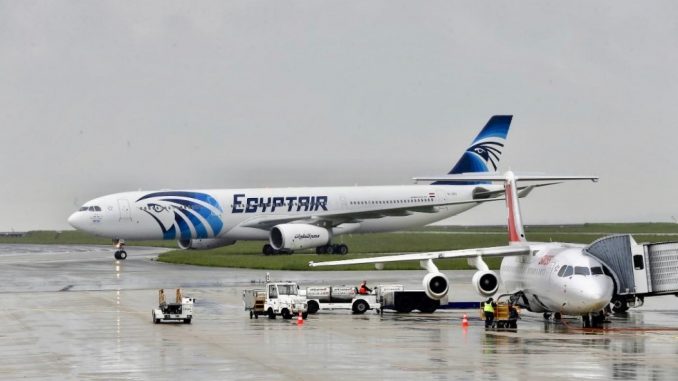
After crash, Egyptian authorities said bomb was probably responsible and reportedly withheld key evidence from French investigators, citing the secrecy of terrorism inquiry
When an EgyptAir flight crashed on its way from Paris to Cairo in May 2016, killing 66 people, Egyptian authorities said a bomb was probably responsible and withheld key evidence from French investigators, citing the secrecy of their counterterrorism inquiry, the Wall Street Journal reported on Sunday.
Now, a French judicial probe has alleged that maintenance and safety lapses by EgyptAir left the plane unsafe to fly in the days before it crashed, according to confidential documents reviewed by the WSJ. A leak of flammable oxygen in the cockpit preceded a fire that likely disabled the plane, the documents say, contradicting Egypt’s claim of a terrorist act.
The plane registered mechanical errors on its final five flights, according to automated messages sent by the plane. EgyptAir pilots and the airline’s technical center in Cairo largely ignored them, according to the documents.
Before leaving Cairo on its penultimate flight, “the plane should have been checked during its four previous flights, and should not have left Cairo after the appearance of repeated faults that were not reported by successive teams”, said one of the documents, an expert report ordered by a judge, according to the WSJ.
A source close to the French investigation had told AFP in May 2017 that no traces of explosives were found on the remains of French victims. That revelation, the source said, “closed the door” on the theory advanced by Egypt that the Airbus 320 was blasted out of the sky.
France opens a judicial investigation whenever one of its citizens is killed in a plane crash. The EgyptAir inquiry, which is continuing, has not established whether the crash was caused by the airline’s alleged lapses that investigators identified, the WSJ reported.
EgyptAir and Egyptian government agencies didn’t respond to repeated requests by the WSJ for comment. Egypt’s civil aviation ministry has previously denied that the plane registered technical faults in the days before it crashed.
The country’s response to the crash exposes weaknesses in the international air-safety treaty that dictates how governments should cooperate on plane-crash investigations. American and European authorities have little recourse if an authoritarian nation refuses to conduct an investigation or allow other countries involved in an incident to examine key evidence or documentation, the WSJ said.
EgyptAir flight crash was accidental, not terrorism: French officials
No traces of explosives were found on the remains of French victims from an EgyptAir plane that crashed into the Mediterranean in May 2016, a source close to the French investigation told AFP then.
The revelation, the source said, “closes the door” on a theory advanced by Egypt that the Airbus A320 was blasted out of the sky as it made its way from Paris to Cairo, killing all 66 people on board.
EgyptAir MS804 disappeared from radar over the Mediterranean on 19 May, crashing into the water between Crete and the coast of northern Egypt.
“There were no explosive charges” aboard the plane, the source said, because “no traces of powder were found” by police in samples taken from the remains of eight of the 15 French nationals killed.
Egyptian authorities had handed the remains to their families in January.
According to the source, the long-awaited results were “recently” reported to the three investigating judges in charge of the case in Paris.
The findings “only serve to confirm the theory by French investigators since the beginning, that this was an accident and not an act of terror,” the source said, adding that “this definitively closes the door on the claim of terrorism”.
In December, an official Egyptian investigative committee had said it found traces of explosives on victims’ remains, but French officials at the time refused to draw conclusions on the cause of the accident.
Suspicions initially fell on militant groups, especially the Islamic State group, which has previously threatened both France and Egypt. No one has claimed responsibility for the crash, which also killed 40 Egyptians, including the 10-member crew.
French investigators have always favored a mechanical fault as the crash cause, saying a fire broke out in or near the cockpit of the plane before it plunged 22,000 feet (6,700 meters) and swerved sharply before disappearing from radar screens.
“At this stage, the combustion or self-combustion of a tablet in the cockpit is the working hypothesis,” the source said, but “elements” needed to prove it – such as debris from “the cabin or flight recorders” – “are in Egypt and the Egyptians have not shown a great willingness to collaborate”.
Air-safety experts and officials have raised concerns that the crash of the Airbus 320, the world’s top-selling passenger jet, will remain a mystery so long as Egypt controls the probe. Airbus declined to comment, the WSJ reported.



